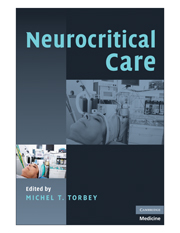Book contents
- Frontmatter
- Contents
- Contributors
- Foreword
- Introduction
- SECTION I PRINCIPLES OF NEUROCRITICAL CARE
- SECTION II NEUROMONITORING
- SECTION III MANAGEMENT OF SPECIFIC DISORDERS IN THE NEUROCRITICAL CARE UNIT
- 10 Ischemic Stroke
- 11 Intracerebral Hemorrhage
- 12 Cerebral Venous Thrombosis
- 13 Subarachnoid Hemorrhage
- 14 Status Epilepticus
- 15 Nerve and Muscle Disorders
- 16 Head Trauma
- 17 Encephalopathy
- 18 Coma and Brain Death
- 19 Neuroterrorism and Drug Overdose
- 20 Central Nervous System Infections
- 21 Spinal Cord Injury
- 22 Postoperative Management in the Neurosurgical Critical Care Unit
- 23 Ethical and Legal Considerations in Neuroscience Critical Care
- SECTION IV MANAGEMENT OF MEDICAL DISORDERS IN THE NEUROCRITICAL CARE UNIT
- Index
- Plate section
19 - Neuroterrorism and Drug Overdose
from SECTION III - MANAGEMENT OF SPECIFIC DISORDERS IN THE NEUROCRITICAL CARE UNIT
Published online by Cambridge University Press: 27 April 2010
- Frontmatter
- Contents
- Contributors
- Foreword
- Introduction
- SECTION I PRINCIPLES OF NEUROCRITICAL CARE
- SECTION II NEUROMONITORING
- SECTION III MANAGEMENT OF SPECIFIC DISORDERS IN THE NEUROCRITICAL CARE UNIT
- 10 Ischemic Stroke
- 11 Intracerebral Hemorrhage
- 12 Cerebral Venous Thrombosis
- 13 Subarachnoid Hemorrhage
- 14 Status Epilepticus
- 15 Nerve and Muscle Disorders
- 16 Head Trauma
- 17 Encephalopathy
- 18 Coma and Brain Death
- 19 Neuroterrorism and Drug Overdose
- 20 Central Nervous System Infections
- 21 Spinal Cord Injury
- 22 Postoperative Management in the Neurosurgical Critical Care Unit
- 23 Ethical and Legal Considerations in Neuroscience Critical Care
- SECTION IV MANAGEMENT OF MEDICAL DISORDERS IN THE NEUROCRITICAL CARE UNIT
- Index
- Plate section
Summary
Knowledge of proper clinical management of drug overdose and chemical and biological toxin exposure is important for the neurocritical care specialist. Many of the common off enders principally affect the central nervous system (CNS). Even those that do not will lead to a severely incapacitated state when overdosed such that the afflicted patient will require critical care in an intensive care unit (ICU).
Typically, drug overdose that occurs outside of the hospital is first managed in the emergency department and then, if critical care is needed, in the medical intensive care unit. However, there are medications that are used in the neurocritical care unit (NCCU) that may lead to toxic overdose either through inadvertent provider error or because of changes in a patient's drug elimination. The most common offending medications are analgesics, antipyretics, mood stabilizers, and sedativehypnotics.
Sadly, there is another circumstance in which the neurointensivist may be called on to treat patients suffering from toxic overdose: a chemical or biological terrorist act. In this situation, emergency medicine and medical critical care physicians will be quickly overwhelmed, and it is certain that the neurocritical care specialist will be called upon to assist. Thus, a discussion of the clinical management of patients suffering from exposure to the leading known chemical weapons is warranted.
DRUG OVERDOSE
The most common medications leading to overdose are analgesics, antipyretics, sedative hypnotics, anticonvulsants, anticoagulants, antidepressants, bronchodilators, and antiarrhythmics. All are common medications used in the NCCU.
- Type
- Chapter
- Information
- Neurocritical Care , pp. 242 - 261Publisher: Cambridge University PressPrint publication year: 2009



